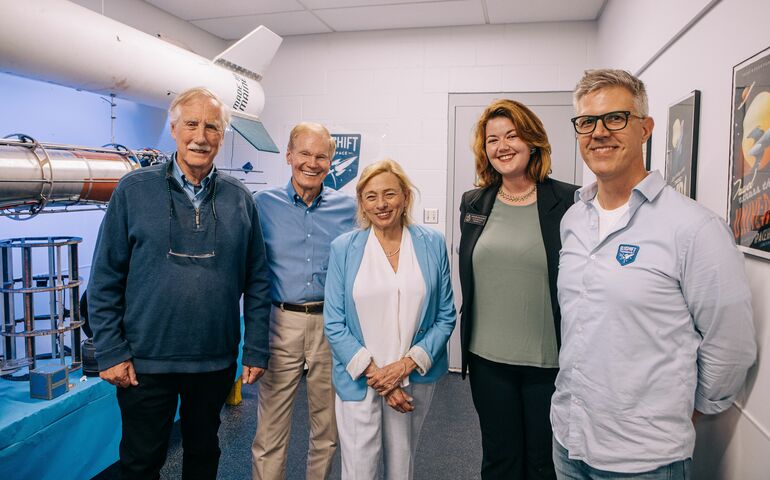Star power: Momentum builds for inaugural Maine space conference
- July 18, 2023
July 17, 2023

Maine’s first-ever space conference this November is still a ways off, but a call for conference speakers and presenters this April attracted more than 60 applications, much higher than expected.
“We anticipated in the vicinity of 25 to 30 applications,” said Terry Shehata, executive director of the Maine Space Grant Consortium, which is putting together the conference, scheduled for Nov. 5-7 in Portland. “We are amazed and energized by the extraordinary level of interest, not only from within Maine, but from other states, too.”
The Maine Space Conference is a key initiative of Maine Space 2030 and part of a statewide campaign to raise awareness of the potential of Maine’s NewSpace economy.
According to Shehata, who co-founded Maine Space 2030, a fully-fledged NewSpace industry could contribute between $550 million to $1.1 billion per year to Maine’s gross domestic product GDP and provide between 2,800 and 5,500 jobs by 2042.
“Maine has a fleeting window of opportunity to enter the NewSpace economy and to seize the incredible benefits at a local and statewide level,” said Shehata.
The conference — which will take place at the Holiday Inn By the Bay — is designed to bring together industry professionals and discuss how the space industry has evolved and might evolve into the future for Maine.
Participants who have signed on so far include include business leaders, research organizations, state government, higher education faculty and students, and primary school educators and students.
NASA Associate Administrator Michael Kincaid from the Office of STEM Engagement will be a keynote speaker.
Also attending and presenting will be representatives from Fiber Materials Inc., Spirit AeroSystems, bluShift Aerospace, ExoAnalytic Solutions Inc., K-12 teachers and students, the Roux Institute at Northeastern University, and several dozen faculty and graduate students from the University of Maine System.
Presenters from outside Maine include Judi Sandrock of MaxIQ Space, the Rand Corp. from Bedford, N.H.; Foundation for the Future from Falls Church, Va.; the Global Space Industry Trade Association from Santa Fe, N.M.; Rogue Space Systems from Laconia, N.H.; and a member of the Hawaii State House of Representatives.
The conference will touch on seven themes, including Space education, space workforce, sustainability, Maine’s space industry, data and analytics, research and development, and finance and policy.
Up to 300 expected
As many as 300 people are anticipated to attend what is envisioned as an annual gathering.
“The conference is one exciting aspect of a broad effort to build the state’s capabilities to develop next-generation resources for high-growth data-rich industries,” said Shehata. “If we succeed, by 2030 students, teachers and businesses around Maine will see themselves in Maine’s space future.”
NASA Administrator Bill Nelson visited Brunswick Landing last month — with US. Sen. Angus King, I, Maine; Gov. Janet Mills; and state Sen. Mattie Daughtry (D-Brunswick) — where he was introduced to members of Maine’s growing aerospace industry.
The Maine Space Corp. is a quasi-state body established by the Maine Legislature and signed into law in April 2022, with the mission to manage the growth and development of a Maine Space Complex to engage Maine in the growing global new space economy. The corporation held its first meeting last month.
According to Shehata, “With over 85 aerospace companies already operating in Maine, world-class advanced materials facilities, and an unrivaled polar orbit geographical advantage, Maine has the hard and soft assets to launch a national environmentally responsible leading-edge hub for the NewSpace industry, particularly as it relates to small rocket and nanosatellite markets.”
Shehata said Maine is at a critical crossroads for success, which includes recruiting space-related businesses; building on research and development and educational capabilities; and building a pipeline of students and workers.
“Our pathway to space leads through our schools and universities, our entrepreneurs and business leaders, and through the funders and believers who can envision Maine as a NewSpace leader,” he said.
Find more information about the conference here.
